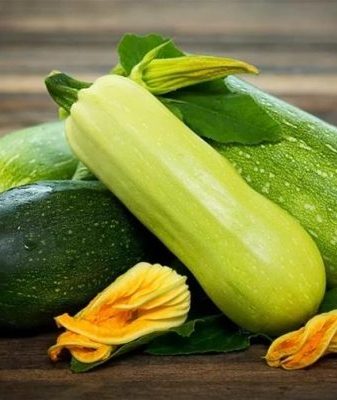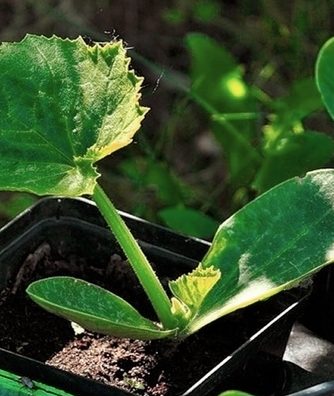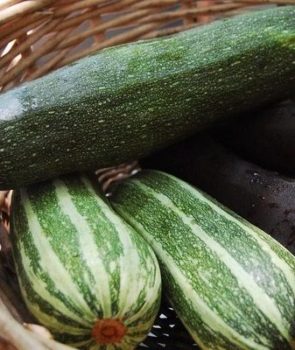Why do zucchini rot in the garden
Content:
Zucchini is a very healthy and popular vegetable. They are unpretentious to care for and almost always have good yields. They can be fried, stewed and baked, and certainly no one will refuse zucchini pancakes with sour cream. But sometimes, to the chagrin of gardeners, the fruits of the zucchini begin to rot, and this can happen both with the ovaries and with the already grown fruits that they did not manage to remove from the bush in time. In most cases, this is due to unfavorable weather, plant diseases or mistakes in plant care. Next, we will take a closer look at all these reasons and talk about what to do to save the harvest and why do zucchini rot in the garden?
Correct planting of plants
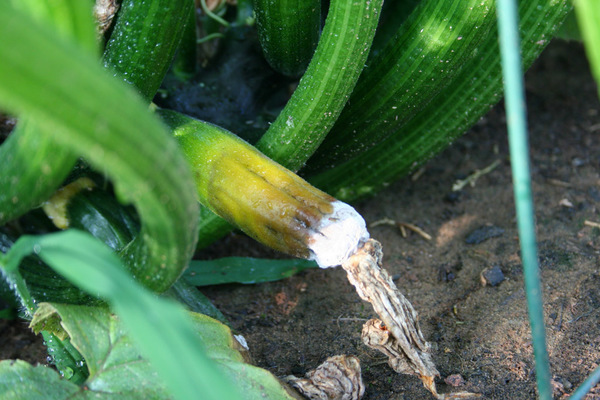
Zucchini rot in the garden: photo
Often the problem that zucchini rot in the garden arises from the wrong place or mistakes when planting seedlings or seeds. Based on the rules of crop rotation, do not plant zucchini where other members of the pumpkin family grew in the previous year: squash, cucumber, pumpkin or watermelon with melons. These crops have already taken all the necessary substances from the soil and zucchini cannot grow on such land. Yes, the seeds will sprout, but there will be no harvest. Plants of the same species can be planted on the previous bed no earlier than four years later.
Zucchini love the sun, that is, they should be planted in an open place. In addition to sunlight, space is very important, therefore, the distance between plants must be observed, for each bush there should be about one square meter. Too dense plantings create high humidity, and pathogenic bacteria begin to actively act in such an environment. The bud under the bushes can be mulched with hay, sawdust or bark, then the fruits during the growth process will not touch the ground, which will also reduce the likelihood of rotting.
If only 2-3 ovaries have rotted, then they should be removed, but if you notice that the resulting fruits rot systematically, then tear off all the flowers, and sprinkle the ends of the fruits and the bush with ash.
Why do zucchini rot in the garden? Causes
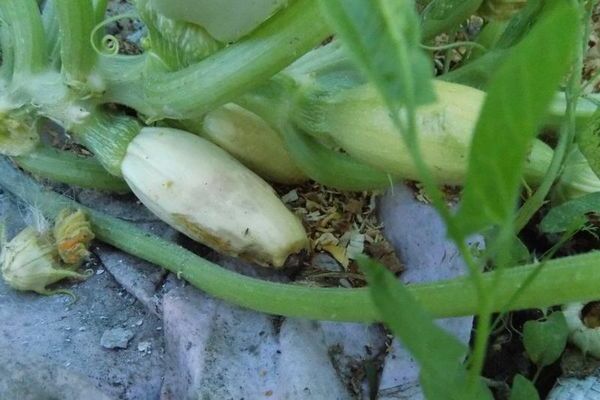
Zucchini rot in the garden: photo
There are several reasons due to which zucchini rot in the garden. With the appropriate knowledge, you can identify them and start solving the problem.
Excessive moisture and fertilizer overdose. All plants need to be fed if you expect a good harvest. But zucchini overfed with organic matter begin to actively grow leaves, which impede ventilation inside the bush and interfere with the penetration of sunlight.
Carried away by organic fertilizers, gardeners often forget about such important elements as iodine, boron and calcium, namely, their lack reduces the plant's immunity and makes it more susceptible to diseases and adverse weather conditions. Behind the overgrown foliage, you may not immediately notice that the ovaries are rotting, and if they are not removed in time and measures are not taken, then putrefactive processes spread to the entire bush and the crop will be lost. If at the same time it is rainy weather or you abuse watering, then a greenhouse effect arises in the garden, which only exacerbates the problem. Fertilizers and watering are necessary, but it is important to observe the measure.
Bloom problem. Zucchini often begins to rot from a flower. The most susceptible to decay is a non-pollinated flower. Again, rainy weather can be a problem - this significantly reduces the chances of pollination, since bees and bumblebees do not "work" in the rain.Then you can resort to artificial pollination and help zucchini by transferring pollen from a male flower to a female one.
If you water the garden from a watering can or a hose with a sprinkler, then water can linger in the large flowers of the zucchini, the flower cannot dry out under the large leaves and begins to rot, then the rot spreads to the ovary.
Plant diseases. Often, rotting can begin due to a disease of the bush, for example, powdery mildew. This is a fungal disease, the main symptom of which is white bloom and spots that first appear on the leaves, and then on the fruits. The cause of this disease may be the use of cold water during irrigation, changes in day and night temperatures, an overdose of nitrogen fertilizers. Any fungal disease often leads to rot, so it is better to prevent than to cure. If we talk about fertilizers, then use complex mineral dressings during the season, since potassium and phosphorus have a positive effect on plant immunity. And it is better to apply organic fertilizers in the fall, in the process of preparing the beds for the next season.
In addition, you can use folk remedies and use garlic infusion in order to prevent fungal infections. To do this, finely chop three to four heads and pour ten liters of water. After the product is infused, spray the zucchini bushes.
Zucchini rot in the garden: what to do?
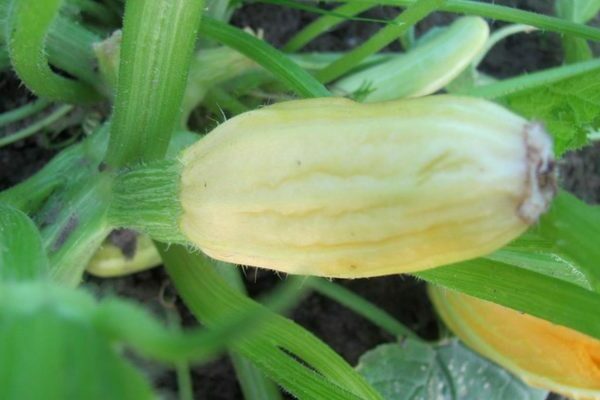
Zucchini rot in the garden: photo
From all of the above, it follows that in most cases the reason why zucchini rot in the garden is associated with waterlogging, so first of all it is necessary to establish an irrigation regime and adjust its volumes. In dry weather, watering the zucchini is enough once a week, pouring about two buckets of water under each bush. It is necessary to pour water on the soil, and not on the plant, and this should be done gradually so as not to erode the ground near the roots. The field of irrigation must be loosened so that a dense crust does not form, which makes it difficult for air to reach the roots. When watering, ash can be added to the water to help prevent rotting.
Provide good ventilation by removing old leaves. Do not tear them off, but cut them with a sharp pruner or garden shears, leaving stumps about four centimeters. The next day after such a procedure, you can spray the bush with a solution of brilliant green (a teaspoon per 10 liters of water). Sometimes you can remove younger leaves if they block the sun's rays from entering the bush, this will help prevent the development of powdery mildew.
If the summer is rainy, then you can organize a canopy made of plastic wrap over the zucchini. This design will prevent waterlogging, while maintaining air circulation.
All cut leaves and removed rotting fruits must be burned. Some people dump all green waste into compost, but contaminated plants reduce its quality and are a source of disease in the following years.
It is possible to compensate for the lack of essential minerals by carrying out foliar feeding, this will increase the immunity of the plant and contribute to more active fruiting. To prepare the iodine solution, dilute about 35 drops of alcoholic tincture in ten liters of water and spray the zucchini. Boron deficiency can be replenished by spraying with boric acid solution (2 grams per ten liters of water).
If the zucchini is on damp ground, then this can also cause rotting. Earlier we talked about mulching the soil under the bushes. If this is not possible, then place boards, sawdust or straw under the fruits. In addition, do not forget to collect snails and slugs from the beds, which actively spread in a humid environment.
Now in agricultural stores you can buy seeds of hybrid varieties that have increased resistance to diseases and, thanks to this, many problems can be avoided.
The only drawback of such zucchini is that their seeds are not suitable for planting next year.
As you can see, the problem of zucchini rotting in the garden can be prevented if the plants are carefully looked after. At the beginning of the article, we talked about the fact that zucchini are unpretentious, and this is really so. But even the most unpretentious plants need to provide comfortable conditions if you are counting on a rich harvest.
Why zucchini rot in the garden and what to do: video


